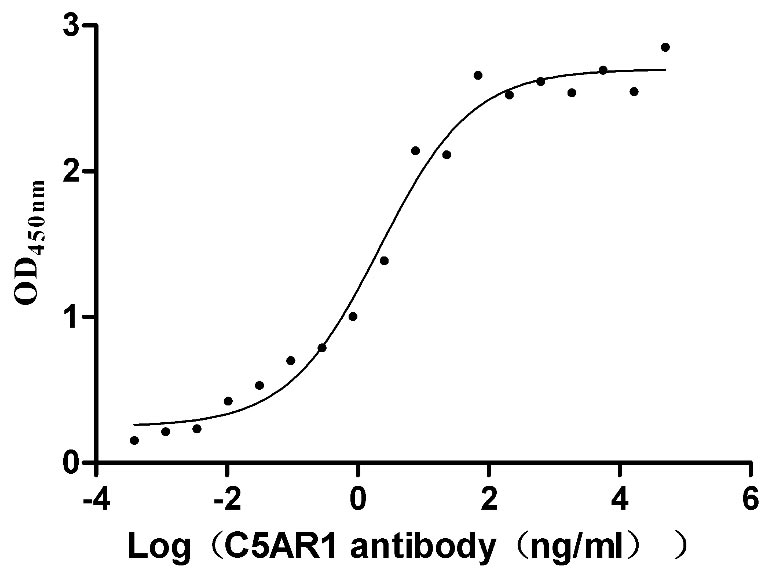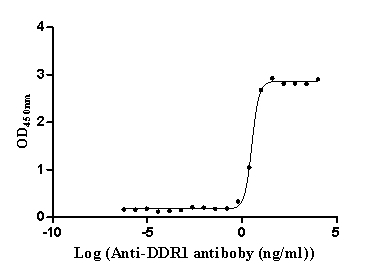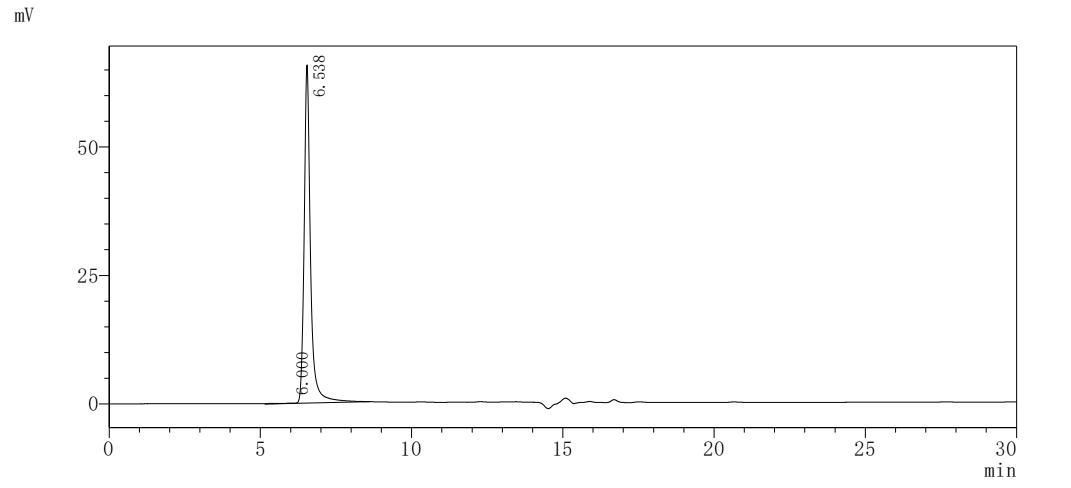Recombinant Mayaro virus Polyprotein P1234, partial
-
中文名稱:Recombinant Mayaro virus Polyprotein P1234,partial
-
貨號:CSB-YP844419MJAK
-
說明書:
-
規格:
-
來源:Yeast
-
其他:
-
中文名稱:Recombinant Mayaro virus Polyprotein P1234,partial
-
貨號:CSB-EP844419MJAK
-
說明書:
-
規格:
-
來源:E.coli
-
其他:
-
中文名稱:Recombinant Mayaro virus Polyprotein P1234,partial
-
貨號:CSB-EP844419MJAK-B
-
說明書:
-
規格:
-
來源:E.coli
-
共軛:Avi-tag Biotinylated
E. coli biotin ligase (BirA) is highly specific in covalently attaching biotin to the 15 amino acid AviTag peptide. This recombinant protein was biotinylated in vivo by AviTag-BirA technology, which method is BriA catalyzes amide linkage between the biotin and the specific lysine of the AviTag.
-
其他:
-
中文名稱:Recombinant Mayaro virus Polyprotein P1234,partial
-
貨號:CSB-BP844419MJAK
-
說明書:
-
規格:
-
來源:Baculovirus
-
其他:
產品詳情
-
純度:>85% (SDS-PAGE)
-
基因名:N/A
-
Uniprot No.:
-
別名:Polyprotein P1234; P1234; Non-structural polyprotein) [Cleaved into: Polyprotein P123'; P123'); Polyprotein P123; P123); mRNA-capping enzyme nsP1; EC 2.1.1.-; EC 2.7.7.-; Non-structural protein 1); Protease nsP2; EC 3.1.3.33; EC 3.4.22.-; EC 3.6.1.15; EC 3.6.4.13; Non-structural protein 2; nsP2); Non-structural protein 3'; nsP3'; EC 3.1.3.84); Non-structural protein 3; nsP3; EC 3.1.3.84); RNA-directed RNA polymerase nsP4; EC 2.7.7.19; EC 2.7.7.48; Non-structural protein 4; nsP4)]
-
種屬:Mayaro virus (strain Brazil) (MAYV)
-
蛋白長度:Partial
-
蛋白標簽:Tag?type?will?be?determined?during?the?manufacturing?process.
The tag type will be determined during production process. If you have specified tag type, please tell us and we will develop the specified tag preferentially. -
產品提供形式:Lyophilized powder Warning: in_array() expects parameter 2 to be array, null given in /www/web/cusabio_cn/public_html/caches/caches_template/default/content/show_product_protein.php on line 662
Note: We will preferentially ship the format that we have in stock, however, if you have any special requirement for the format, please remark your requirement when placing the order, we will prepare according to your demand. -
復溶:We recommend that this vial be briefly centrifuged prior to opening to bring the contents to the bottom. Please reconstitute protein in deionized sterile water to a concentration of 0.1-1.0 mg/mL.We recommend to add 5-50% of glycerol (final concentration) and aliquot for long-term storage at -20℃/-80℃. Our default final concentration of glycerol is 50%. Customers could use it as reference.
-
儲存條件:Store at -20°C/-80°C upon receipt, aliquoting is necessary for mutiple use. Avoid repeated freeze-thaw cycles.
-
保質期:The shelf life is related to many factors, storage state, buffer ingredients, storage temperature and the stability of the protein itself.
Generally, the shelf life of liquid form is 6 months at -20°C/-80°C. The shelf life of lyophilized form is 12 months at -20°C/-80°C. -
貨期:Delivery time may differ from different purchasing way or location, please kindly consult your local distributors for specific delivery time.Note: All of our proteins are default shipped with normal blue ice packs, if you request to ship with dry ice, please communicate with us in advance and extra fees will be charged.
-
注意事項:Repeated freezing and thawing is not recommended. Store working aliquots at 4°C for up to one week.
-
Datasheet :Please contact us to get it.
靶點詳情
-
功能:Inactive precursor of the viral replicase, which is activated by cleavages carried out by the viral protease nsP2.; The early replication complex formed by the polyprotein P123 and nsP4 synthesizes minus-strand RNAs. As soon P123 is cleaved into mature proteins, the plus-strand RNAs synthesis begins.; The early replication complex formed by the polyprotein P123' and nsP4 synthesizes minus-strand RNAs (Probable). Polyprotein P123' is a short-lived polyprotein that accumulates during early stage of infection (Probable). As soon P123' is cleaved into mature proteins, the plus-strand RNAs synthesis begins (Probable).; Cytoplasmic capping enzyme that catalyzes two virus-specific reactions: methyltransferase and nsP1 guanylyltransferase. mRNA-capping is necessary since all viral RNAs are synthesized in the cytoplasm, and host capping enzymes are restricted to the nucleus (Probable). The enzymatic reaction involves a covalent link between 7-methyl-GMP and nsP1, whereas eukaryotic capping enzymes form a covalent complex only with GMP. nsP1 capping consists in the following reactions: GTP is first methylated into 7-methyl-GMP and then is covalently linked to nsP1 to form the m7GMp-nsP1 complex from which 7-methyl-GMP complex is transferred to the mRNA to create the cap structure. NsP1 is needed for the initiation of the minus-strand RNAs synthesis. Probably serves as a membrane anchor for the replication complex composed of nsP1-nsP4. Palmitoylated nsP1 is remodeling host cell cytoskeleton, and induces filopodium-like structure formation at the surface of the host cell.; Multifunctional protein whose N-terminus is part of the RNA polymerase complex and displays NTPase, RNA triphosphatase and helicase activities. NTPase and RNA triphosphatase are involved in viral RNA capping and helicase keeps a check on the dsRNA replication intermediates. The C-terminus harbors a protease that specifically cleaves the polyproteins and releases the mature proteins. Required for the shutoff of minus-strand RNAs synthesis. Specifically inhibits the host IFN response by promoting the nuclear export of host STAT1. Also inhibits host transcription by inducing rapid proteasome-dependent degradation of POLR2A, a catalytic subunit of the RNAPII complex. The resulting inhibition of cellular protein synthesis serves to ensure maximal viral gene expression and to evade host immune response.; Seems to be essential for minus-strand RNAs and subgenomic 26S mRNAs synthesis. Displays mono-ADP-ribosylhydrolase activity (Probable). ADP-ribosylation is a post-translational modification that controls various processes of the host cell and the virus probably needs to revert it for optimal viral replication (Probable). Binds proteins of FXR family and sequesters them into the viral RNA replication complexes thereby inhibiting the formation of host stress granules on viral mRNAs (Probable). The nsp3'-FXR complexes bind viral RNAs and probably orchestrate the assembly of viral replication complexes, thanks to the ability of FXR family members to self-assemble and bind DNA (Probable).; Seems to be essential for minus-strand RNAs and subgenomic 26S mRNAs synthesis. Displays mono-ADP-ribosylhydrolase activity. ADP-ribosylation is a post-translantional modification that controls various processes of the host cell and the virus probably needs to revert it for optimal viral replication. Binds proteins of G3BP family and sequesters them into the viral RNA replication complexes thereby inhibiting the formation of host stress granules on viral mRNAs. The nsp3-G3BP complexes bind viral RNAs and probably orchestrate the assembly of viral replication complexes, thanks to the ability of G3BP family members to self-assemble and bind DNA.; RNA dependent RNA polymerase. Replicates genomic and antigenomic RNA by recognizing replications specific signals. The early replication complex formed by the polyprotein P123 and nsP4 synthesizes minus-strand RNAs. The late replication complex composed of fully processed nsP1-nsP4 is responsible for the production of genomic and subgenomic plus-strand RNAs. The core catalytic domain of nsP4 also possesses terminal adenylyltransferase (TATase) activity that is probably involved in maintenance and repair of the poly(A) tail, an element required for replication of the viral genome.
-
亞細胞定位:[Polyprotein P1234]: Host cytoplasmic vesicle membrane; Peripheral membrane protein.; [Polyprotein P123']: Host cytoplasmic vesicle membrane; Peripheral membrane protein.; [Polyprotein P123]: Host cytoplasmic vesicle membrane; Peripheral membrane protein.; [mRNA-capping enzyme nsP1]: Host cytoplasmic vesicle membrane; Lipid-anchor. Host cell membrane; Lipid-anchor; Cytoplasmic side. Host cell projection, host filopodium.; [Protease nsP2]: Host cytoplasmic vesicle membrane; Peripheral membrane protein. Host nucleus. Host cytoplasm.; [Non-structural protein 3]: Host cytoplasmic vesicle membrane; Peripheral membrane protein.; [Non-structural protein 3']: Host cytoplasmic vesicle membrane; Peripheral membrane protein.; [RNA-directed RNA polymerase nsP4]: Host cytoplasmic vesicle membrane; Peripheral membrane protein.
-
數據庫鏈接:
KEGG: vg:935140
Most popular with customers
-
Recombinant Human Receptor tyrosine-protein kinase erbB-3 (ERBB3), partial (Active)
Express system: Mammalian cell
Species: Homo sapiens (Human)
-
Recombinant Human Neuropilin-1 (NRP1) (Active)
Express system: Mammalian cell
Species: Homo sapiens (Human)
-
Recombinant Human Insulin growth factor-like family member 1 (IGFL1) (Active)
Express system: Mammalian cell
Species: Homo sapiens (Human)
-
Recombinant Human Claudin-18.2 (CLDN18.2)-VLPs (Active)
Express system: Mammalian cell
Species: Homo sapiens (Human)
-
Recombinant Human C5a anaphylatoxin chemotactic receptor 1 (C5AR1)-VLPs (Active)
Express system: Mammalian cell
Species: Homo sapiens (Human)
-
Recombinant Human Epithelial discoidin domain-containing receptor 1 (DDR1), partial (Active)
Express system: Mammalian cell
Species: Homo sapiens (Human)
-
Recombinant Human C-C chemokine receptor type 9 (CCR9)-VLPs (Active)
Express system: Mammalian cell
Species: Homo sapiens (Human)


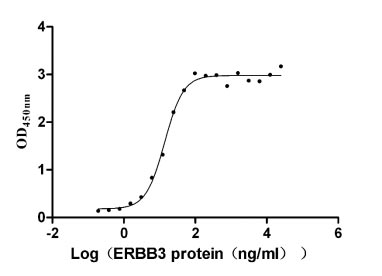
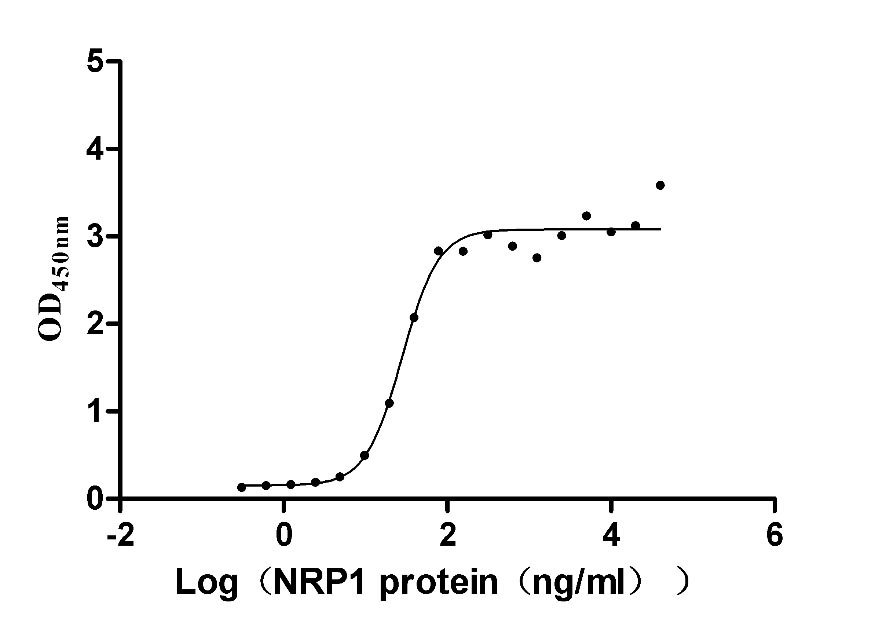
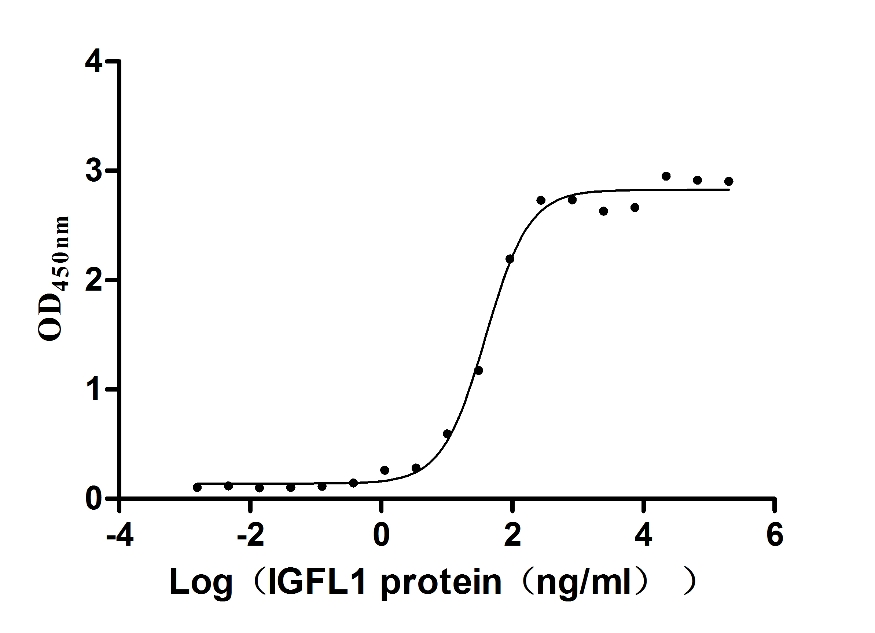
-AC1.jpg)
